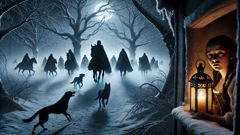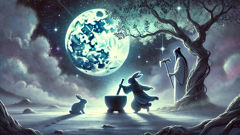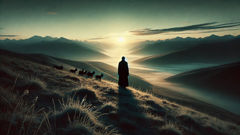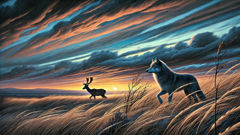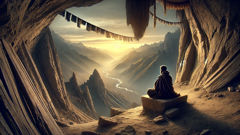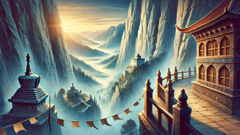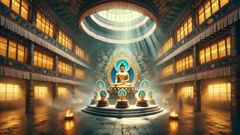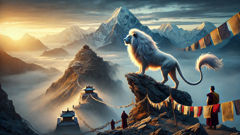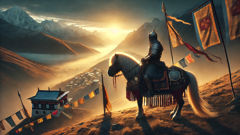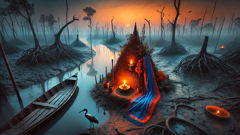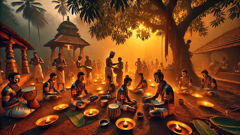Introduction
Long before iron rails carved the earth and lamplight tamed the night, the forests of Thuringia sprawled unbroken, their secrets deep as the ancient roots below. It was an age when villagers still whispered about things unseen, when winter’s darkness seemed alive, and every howl of the wind might be more than just the cold. Among all tales told beside flickering hearths, none sent shivers quite like the legend of the Wild Hunt: a phantom cavalcade surging across the midnight sky, hooves drumming thunder, hounds baying wild, riders trailing mist and chill. Some claimed the Hunt was led by the restless soul of an old king, condemned to roam eternally. Others spoke of witches, forest spirits, or even the god Wodan himself, sweeping through the clouds to claim the souls of the lost or the wicked. But for the small, timber-walled village of Eichenhain, nestled among moss-draped oaks and half-lit glades, the Hunt was no distant myth. It was a shadow that returned every winter, scarring their dreams and sometimes, cruelly, thinning their numbers. To grow up in Eichenhain was to know that not all fears vanish with the morning sun.
One such winter, when the snow lay thick on the eaves and the moon hung low and swollen, a girl named Ada pressed her face to the window of her grandmother’s cottage, heart thrumming with mingled dread and curiosity. The Hunt had come for her family once—her father had vanished beneath a storm’s roar years ago, leaving only his hunting horn tangled in a holly bush. Now, as howls echoed across the white-cloaked hills and spectral lights flickered in the woods, Ada felt the old stories coil around her like brambles. Tonight, as the wind soughed and the fire crackled low, she would learn what it meant to live beneath the shadow of the Wild Hunt—and perhaps, what it took to break free of its spell.
I. Whispers in the Snow
Outside Ada’s cottage, winter pressed in with a quiet, relentless hand. The wind moaned through the black branches, swirling icy dust over the narrow lanes and huddled houses. Each window glowed with candlelight, but none dared open a door after nightfall—not when the Hunt was abroad. Tonight, the world seemed wound tight with tension, every sound magnified in the hush of the frost. Ada’s grandmother, Marta, sat knitting by the hearth, eyes clouded not just with age but with memory. She hummed an old tune, the notes trembling each time the wind howled. Ada watched her, torn between wanting to ask about her father and fearing what she might hear.
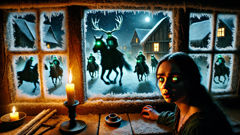
Her gaze drifted to the ancient hunting horn above the mantle—a battered relic, silver chased with runes that no one in the village could read. It was all Ada had left of her father, except for his stories. Marta had told them to her over and over, how her father had vanished the night the Wild Hunt thundered down from the clouds. They said the dead rode with the Hunt, and some believed that those taken could never return. But Ada, stubborn as mountain stone, clung to hope. She’d seen lights in the trees some nights—dancing orbs, blue as ice, that left frost prints where they touched. And always, she sensed that something in the forest called to her.
A sudden chorus of hounds erupted from the darkness, drawing Ada to the window. There, through the frost-laced glass, she saw them: spectral horses rearing, riders crowned in tangled antlers and wolf pelts, their eyes burning green beneath twisted helms. Hounds swirled around them, mouths gaping with light, paws skimming the snow without leaving prints. The Hunt swept past the edge of Eichenhain, wind shrieking in their wake. One rider turned—a woman with hair like storm clouds and a horn slung at her hip. For a heartbeat, Ada thought she saw her father’s eyes staring back at her from beneath that rider’s helm.
She stumbled back, heart hammering. Marta looked up, lips pressed thin. “Don’t watch them,” she whispered. “The Hunt sees who sees them. If you meet their eyes, you may follow them into shadow.”
But Ada couldn’t let go. Something tugged her toward the door—a memory, a longing, or perhaps fate itself. As she slipped outside, snow crunching beneath her boots, she felt the cold bite deep into her bones. The sky churned with cloud and mist; the path ahead vanished into gloom. Still, Ada pressed forward, driven by a hope she dared not name. Somewhere out there, she believed, her father’s spirit waited for her—or something older, darker, and bound to her bloodline.
Behind her, the last lamp flickered out. In the darkness, the wind whispered secrets only the hunted and the hunters could understand.
II. The Heart of the Forest
The night grew deeper as Ada left the last fence behind. The village’s warmth faded with each step, replaced by a hush that felt both watchful and wild. She moved beneath skeletal branches heavy with snow, following the faintest glimmers: the blue ghost-lights that darted between trunks or hovered just above her reach. Each time she faltered, her hand found her father’s horn at her belt—a weight that comforted and unnerved her in equal measure.
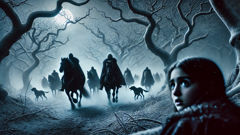
Deep in the Thuringian woods, shadows seemed to breathe. The moon slid behind clouds, turning the world to indigo and silver. Ada pressed on, guided more by instinct than sight. The air grew colder, thick with the scent of pine and something older—iron and smoke, wild thyme and winter’s rot. Above her, a raven croaked, invisible among the branches. A hush followed, then the first distant echo of hooves on frozen earth.
Suddenly, the ground dropped away and Ada found herself on the edge of an ancient clearing. Here, no snow clung to the ground; the grass was black and brittle, the trees leaning inward as if to listen. At the center stood a circle of standing stones, carved with runes like those on her father’s horn. The blue lights gathered here, swirling in slow orbits, illuminating the stones with ghostly fire.
A shape emerged from the mist: a rider on a pale horse, cloaked in tattered black, eyes glowing like embers. Ada froze. The rider dismounted with inhuman grace, boots never quite touching the grass. He raised a hand—not in threat, but in invitation. Ada felt herself drawn forward, every step heavy as a dream. As she entered the circle, she recognized the face beneath the helm: it was her father, but changed, his features sharper and tinged with sadness.
“Ada,” he whispered, voice carried on the wind. “You must not linger. The Hunt is no place for the living.”
Tears stung her eyes. “I came to find you. To bring you home.”
He shook his head. “I ride because I must. The Hunt is bound to me—and to you. Our blood carries the mark. Only one born of our line can end the Hunt’s curse.”
The other riders materialized around them—some men, some women, some neither, all marked by antlers, animal skins, or hollow eyes. The leader stepped forward: the storm-haired woman Ada had glimpsed before. She spoke with a voice like thunder on distant hills.
“The Hunt chases what is lost: souls wandering the border of life and death, those who trespass, and those who dare to seek us out. Will you run from us, Ada, or join us?”
Ada clutched her horn. She saw her father’s longing and the sorrow of all the riders—caught between worlds, unable to rest. The stones pulsed with energy beneath her feet. She remembered Marta’s stories: sometimes, a mortal could outwit or appease the Hunt, but never by force. Only by sacrifice or cunning could one change their fate.
Summoning her courage, Ada raised her horn and sounded a single, clear note. The air trembled; the lights flared. For a heartbeat, the world stilled—and then the riders began to change. Their forms flickered, shadows draining away to reveal faces once hidden by grief. Her father smiled, and his eyes lost their fire.
The leader nodded solemnly. “You have called the Hunt and faced it with an open heart. You may ask a boon.”
Ada took a trembling breath. “Set my father free. Let him rest.”
The stones blazed with blue light. One by one, the riders faded into mist, their burdens lifted. Only the leader remained, her gaze fierce and proud. “The Hunt endures,” she said softly. “But you have earned your place among those who shape its path. Remember what you have seen—and tell your people that not all darkness is to be feared.”
The circle collapsed in a rush of wind and starlight. Ada found herself alone, horn in hand, dawn breaking through the trees. The snow returned beneath her feet, but the cold felt gentler. She had changed something—perhaps only for a moment, but sometimes a moment is enough to break an ancient curse.
Conclusion
The sun rose over Eichenhain, gilding the snow in pale gold. Ada returned to the village with weary steps and a heart strangely light. She slipped quietly into her grandmother’s cottage, where Marta waited by the cold ashes of the hearth. For the first time in years, Ada slept deeply—no nightmares of hooves or howling winds disturbed her rest. When she woke, the horn above the mantle gleamed softly, its runes faded to silver shadows. Outside, neighbors spoke of a night quieter than any in living memory; even the old men who loved to scare children with Hunt tales seemed subdued, as if some weight had lifted.
Ada grew up carrying the memory of that night. She tended the woods with reverence, learned the ways of plants and storms, and never again feared the winter’s darkness. Sometimes, when snow fell thick and the wind howled through the oaks, she would press her face to the window and remember the eyes of her father—grateful, at peace—and the leader of the Hunt, who watched over the borders between worlds. The legend endured, whispered to each new child: that sometimes courage could gentle even the wildest shadows, and that the line between fear and wonder is thinner than moonlight on snow.

